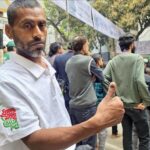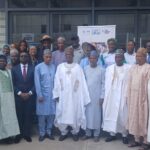By Ebere Agozie
Mrs Ijeoma Nwafor, the Country Representative of the Hague Institute for Innovation of Law (HIIL) says land disputes and domestic violence topped the list of its 2025 Justice Needs and Satisfaction (JNS) in Nigeria report.
Nwafor said this in Abuja on Tuesday during the presentation of the report that tracked how justice problems evolve over time.
She said the study was conducted over three years, and followed the same group of Nigerians to understand the shifting nature of their justice experiences.
She said that land disputes and domestic violence were among the most frequently reported issues, but the findings point to a broader justice gap affecting millions.
“Land disputes affected a large portion of the population and were among the most persistent legal problems reported.
By the final year of the study, they accounted for 24 per cent of all unresolved, long-lasting cases.
“These disputes were also less likely to be resolved through formal mechanisms.
“Many people turned instead to direct negotiation or community leaders, often citing the high cost and complexity of formal justice processes as key reasons for avoiding the courts,’’ she said.
The Country Rep said that domestic violence was reported by 30 per cent of respondents during the study.
“This includes physical violence, emotional abuse, economic deprivation and sexual violence.
“The impact was profound, with survivors reporting stress-related illness, financial loss, harm to family relationships and even job loss.
“Although most people who resolved these problems said the outcome was fair, many others stopped taking action due to a lack of hope or trust in the justice system,’’ she said.
In the areas of key patterns and barriers she said the study shed light on several broader justice trends.
“Issues with neighbours and family members, for example, are likely to come back if the root causes are not addressed or if the original resolution was weak or informal.
“In such cases, formal systems are often bypassed entirely.
“Another finding is that long-lasting legal problems disproportionately affect urban poor communities.
“The majority of these cases were linked to land, domestic violence or debt,’’ she said.
She further said that in spite of the identified challenges, the report showed that people still tried to solve their problems, often through negotiation, family members or local leaders.
“The formal justice system is generally seen in a positive light, but many believe it is designed for lawyers rather than ordinary citizens.
“Trust in police is lower compared to other actors such as religious leaders or community authorities,’’ she said.
She said that as Nigeria sought to improve access to justice and reduce inequality, effective policy depended on a clear understanding of people’s experiences.
“The JNS 2025 report offers just that detailed, nationwide data collected over three years.
“Building on these insights, the report recommends continued, regular collection of people-centred justice data, alongside prioritising affordable, accessible and timely services.
“This includes better pathways for resolving land and domestic violence disputes and more support for informal and community-based resolution mechanisms,” she said.
She said the report showed the justice gap in Nigeria was real and growing, adding that with the right tools and political will the gap could be closed.
“This makes the report a powerful tool for policymakers and justice providers working to improve access to justice in the country.
“What makes this report especially valuable for decision-makers is the detailed evidence it provides on the scale and persistence of justice problems that people are unable to resolve.
“It highlights where current systems fall short and where people are left to navigate complex problems on their own,’’ she said.
Bengt van Loosdrecht, the Ambassador of Netherlands to Nigeria in his speech, reiterated that justice should not be a luxury but a commodity for everyone.
Mr Sunny Daniel, a journalist and member of the governing council of the National Human Rights Commission, said the report should serve as an alarm bell to stakeholders.
“What is released today shows we are still far away from where we desire to be. So let us go back and do more.(NAN)
Edited Uche Anunne












